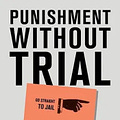“How do you plea?”
It’s the first question the judge asks you in a criminal trial. But before the accused even has a chance to answer “guilty” or “not guilty,” there is another, prior legal proceeding that rarely gets talked about – even though it pre-empts the need for a trial in 97% of convictions. Jury trials were one of the founders’ critical safeguards against the tyranny of overzealous government prosecutors. Thomas Jefferson viewed the institution as the most vital form of democracy – above the ability to vote for legislators. And yet the American legal system has largely abandoned this bedrock principle in favor of the “efficiency” of the plea bargain.
Carissa Hessick is the director of the Prosecutors and Politics Project, Professor of Law at the University of North Carolina School of Law, and author of an important new book, Punishment Without Trial: Why Plea Bargaining Is a Bad Deal.
Professor Hessick joins me to explain how this practice persists as the norm, while jury trials have been turned into a rare exception. What would the Founders say about this state of affairs? And why hasn’t the Supreme Court done something about it?
Share this post

Punishment without trial? It's the new normal
www.bobzadek.com
The Bob Zadek Show
Bob talks about the issues that affect our lives on a daily basis from a purely libertarian standpoint. He believes in small government, fewer taxes, and greater personal freedom.<br /><br />America has lost its way, but it cannot and does not need to be reinvented. Our founders were correct about their approach to government, as were John Locke, Adam Smith and the other great political philosophers who influenced them. The country’s first principles are economic and social freedom, republicanism, the rule of law, and liberty. Bob believes we must take the best of our founding principles and work from them because a country without principles is just a landmass.
Bob talks about the issues that affect our lives on a daily basis from a purely libertarian standpoint. He believes in small government, fewer taxes, and greater personal freedom.<br /><br />America has lost its way, but it cannot and does not need to be reinvented. Our founders were correct about their approach to government, as were John Locke, Adam Smith and the other great political philosophers who influenced them. The country’s first principles are economic and social freedom, republicanism, the rule of law, and liberty. Bob believes we must take the best of our founding principles and work from them because a country without principles is just a landmass.Listen on
Substack App
RSS Feed
Recent Episodes













Punishment without trial? It's the new normal